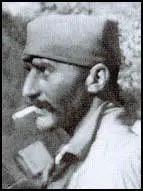Joseph Bianca

Joseph Bianca was born in 1906 and worked on the East Coast waterfront with Paul White. A member of the American Communist Party, he joined the International Brigades on the outbreak of the Spanish Civil War.
He fought with distinction at Teruel, Belchite and Ebro. In March 1938 Paul White was sent to get further supplies of ammunition. Instead, he deserted and drove to the French border. White was unlucky that John Gates was now the battalion commissar. Gates was a strict disciplinarian and had ordered that all deserters should be court-martialed and some of them should be executed as an example to the rest of the soldiers. Milton Wolff agreed with Gates and White was charged with desertion.
At his court-martial Paul White confessed: "After Belchite I knew I was afraid to go into action again. I tried all this time to overcome my feeling of fear. I felt we were doomed and fighting futilely. I dropped out of line and made up my mind to desert and try and reach France." White was found guilty of desertion and the following day he was executed by a six-man firing squad. Joe Bianca complained bitterly about the way White was treated, but as Cecil D. Eby pointed out: "Having just been publicized as the best soldier in the Battalion, Bianca had passed beyond the range of commissariat retaliation."
Joe Bianca was hit in the groin by shrapnel on Hill 666 near Gandesa. Milton Wolff observed that Bianca was "slung in a blanket, gutted like a fish, green and slimy, white, dying." Joe North later reported that "he lay cursing the enemy with every curse picked up in seven seas till out of breath, when he muttered to a scared man beside him: Well, I'll be seeing you in Sunday School."
Primary Sources
(1) Alvah Bessie, Men in Battle (1939)
We began to be aware of exactly how bad the situation was. The Brigade went in with about two thousand men, came out with thirteen hundred; the Lincoln Battalion went in with about five hundred, and now we had about a hundred twenty. Most of the men who had come up from Tarrazona with me for their first action were gone, though many old-timers too had not yet appeared. Sam Grant, decorated just before the action, was gone-steel helmet and all. Joe Bianca, the Italian-American seaman from the machine-gun section, was with us, but half his men were gone, including the social-worker who had reprimanded Irving that day. We lost the commanders of Companies 1, 2 and 3, the only companies we had. We lost the commissars of Companies 1, 2 and 3. Wolff had not yet returned, nor Leonard Lamb of the Brigade staff. Undoubtedly many were still behind the Fascist lines, wandering through the hills toward the Ebro; or so we thought, for they never came. Mail came up with Harry Hakam, the mailman; and we sat crouched around a lighted match under a blanket in a deep ditch, while he went through the mail. He read hundreds of names, but only about fifteen men claimed letters. It took him half an hour to read all the names on the letters, and after the first few times nobody would say, "Dead" or "Missing"; we just kept silent.

